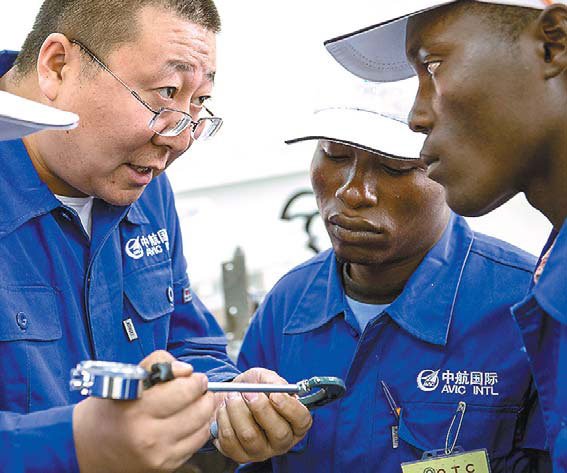|
|
China Investment in Infrastructure Is Key to Africa’s Development
26 February 2015
A Chinese engineer gives training to two African students in the Africa Tech Challenge program.EIRNS —The unique role China’s investment in Africa’s basic infrastructure is playing to unlock Africa’s economic potential, was featured in a Xinhua article yesterday, datelined Kampala, Uganda. The article emphasized the importance of building two key pillars of infrastructure, transport and power, to unlock the large potential of Africa. The importance of road and railway development, and power generation, all of which are now being undertaken by China, were emphasized by two Ugandan economists, themselves writers and researchers, who were cited in the article. One of the economists, Elly Twineyo, said that most of the aid from the West is consumption aid for human resources and governance, while the Chinese aid is going into infrastructural development, which is a long-term investment that "will have a big impact." Once you have infrastructure, he added, the process of development can progress. Twineyo has authored a book on African development: "Why Africa Fails: The Case For Growth Before Democracy." The other Ugandan economist cited by Xinhua, Isaac Shinekwa, stated that China’s concentration on infrastructure development will give Africa more benefit then it has gotten from the West. He said that infrastructure is key to the process of industrialization: "We need the roads to move our goods. We need the railway line to cut down the cost of doing business. From here [Kampala] to Mombasa [the port in neighbouring Kenya] is more costly to transport than from there to Europe." In addition to the transportation bottleneck, the lack of sufficient power results in many African factories running below full capacity. Use of diesel generators raises the cost of production. Chinese companies are busy in Africa, the article notes, building power and transportation infrastructure. China is building a standard gauge railroad from Mombasa (Kenya) to the capital, Nairobi, which will subsequently extend to three land-locked countries: Uganda, and then to Rwanda, which has never had any kind of rail connection to the sea, as well as to South Sudan, which is in a similar predicament. This rail network will significantly lower the cost of transportation, and make the region more trade competitive. China is also building hydro-power dams in Uganda, Ethiopia, and other parts of Africa, to eliminate the power bottleneck. In the words of Twineyo: "The Chinese give roads, they give power, that is the form of aid which Africa now wants." He said that Africa has to get beyond the level of aid recipients, by building its capacity to be able to trade at the same level as China and other world economic powers. [See the article in the next issue of EIR on the Chinese shift of emphasis since Xi Jinping became president, away from a focus on acquiring needed raw materials from Africa, to that of putting the focus on the development of the African continent, as opposed to bilateral Chinese relations with individual countries, which is the significance of the signing of a Memorandum of Understanding Jan. 27 to develop the infrastructure of the continent.] Douglas DeGroot Subscribe to EIR Online here |


